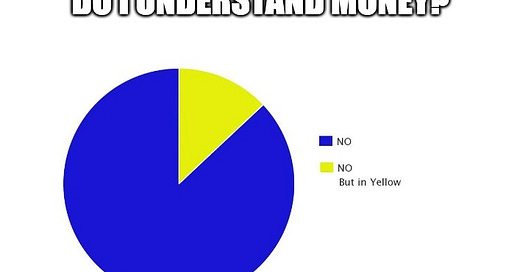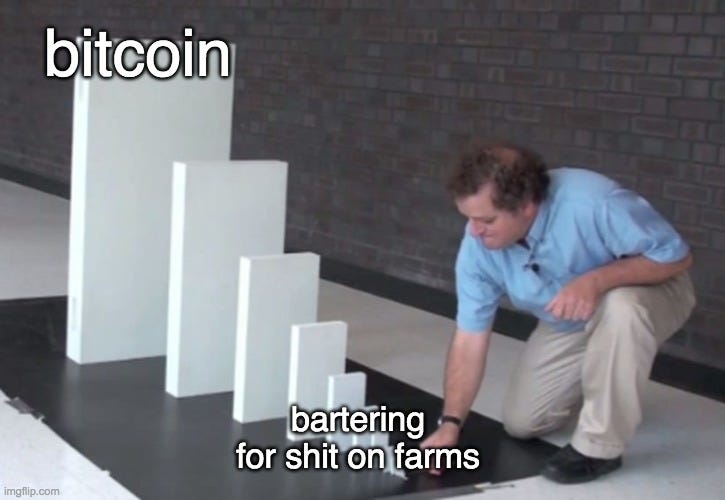Introductory Thoughts
Money is one of those things that doesn’t really make sense when I really think about it.
Like, seriously, why does the green paper thing in my brown leather thing allow me to buy a coffee thing from Starbucks? It’s really odd cuz it’s just green paper with numbers printed on it. And why can’t I use my green paper things when I cross a line on a map? Why do I have to swap my green paper things for multi-colored paper things? And, and, and, why can I pay for things with my plastic thing in my brown leather thing at some stores, while other stores tell me I have to have another brand of plastic things to buy things?
It’s all so confusing.
So I thought about it (money) for all of Monday.
And here are three things I think I think about money:
1. Money Is Memetic Power Resonating From the Most Influential Nation
Ok so I borrowed this idea from Ray Dalio, the now retired founder of Bridgewater Associates. His thesis on money sort of boils down to this: the reserve currency of the world is most often backed by the most influential empire or nation at that time. Of course, this is not just a made up thesis — the data backs it up, as exemplified by this chart showing the relative dominance of great empires (the lines at the bottom) compared to the status of global reserve currencies since 1530 (the bars at the top).
Notably, Dalio argues that money and the nations backing money change in a pretty cyclical manner, with a nation and its reserve currency rising and peaking over about 100 years (with a nation’s currency remaining dominant about 50ish years after a nation’s peak). For example, the UK peaked in “relative standing” in the mid 1800s but the pound kept its reserve status until roughly 1910 (hello world war 1).
He sort of creates the heroes journey but for money.
Under this thesis, money is pretty simple: it is the living embodiment of who is in charge.
In the context of our current, um, context, this means that the US dollar is the only money that matters. Just look at the data (courtesy of the Congressional Research Service). 60% of foreign central bank reserves are held in US dollars. 90% of forex transactions involve dollars. Over half of all international loans and trades are invoiced or denominated in dollars.
In the sense that money needs to be defined, it can be defined as “a thing that the US government guarantees by being the most influential nation”. In other words, money is a meme (idea) originating from the US’ power to tell other people that “these green things are worth this much” and those people saying “ok, we agree to this because we are kinda scared of you.”
Wen (if?) the US ever loses power, then the definition of money will change, and might change drastically. (For instance, if China becomes the definer of money, the world might get wayyyyy more dystopian.)
2. Money Is Whatever Has These Characteristics
Ok, so really, when I ask “what is money” someone could answer “toilet paper” and be correct.
Why? Well, we all just lived thru the great TP Shortage of 2020 caused by covid-19, where TP sort of became the suburban equivalent of how cigarretes in prison are represented in prison. For a brief period of time, TP became super important and hard to get and people could use their hoarded TP to barter with neighbors for other things like, um, hand sanitizer or, um, water bottles?
2020 was a wild time to be alive, lol.
In reality, “money” is just a concept waiting for a “thing” to combine the following characteristics in the bare minimum way:
durability — can last a long time
divisibility — can be turned into smaller units
fungibility — each smaller unit is = to other smaller units
portability — can be moved
verifiability — can be proven to be the ~real~ thing
scarcity — there isn’t that much of it
Toilet paper is bad money in the sense that it does not last long, is awkward to move (try to fit a TP roll in your pocket), can’t be divided into that many units, and is usually not scarce (however, during covid it became super scarce, which made it better money at the time).
On the other hand, cash (those blessed little green things) is pretty good money, as it lasts a long time, can be exchanged for smaller units, each $1 bill = to other $1 bills, it can be moved easily, and banks can verify that certain bills are real or fake. (side note: notice I said nothing about scarcity.)
From a philosophical standpoint, it’s pretty easy to see how humanity went from bartering to using like shells or some shit to precious metals to paper things in the last few eons.
Thought train time:
Bartering is built on scarcity (gib me 2000 ears of corn for my one cow, as cows are scarcer than corns). But bartering is not efficient, so people end up moving to shells or rocks as payment for things. This works great for awhile until some person figures out a way to find more shells or more rocks in nature, making verifiability a massive problem. So then precious metals are introduced — woohoo. At which point the idea of divisibility and portability becomes tough (only banks can store and cut up metals correctly, making it hard for normal ppl to utilize it). So, of course, paper money representing that gold is created, which makes money super easy to carry around and stuff. But, welp, then it gets pretty easy for the people holding the gold representing the paper to just print more paper, wherein scarcity becomes an issue again (hello US dollar). And, well, then somebody invents a digital type of money with a supply cap that cannot be tampered with…but we don’t know how that story ends yet.
You get the point.
And if you don’t get the point, well, then here is the point: money is a thing that is durable, divisible, fungible, portable, verifiable, and scarce. Some things (like gold, cash, or bitcoin) are better at being money than other things, but, well, every thing could technically be money.
Here’s a chart that sort of exemplifies what I’m talking about (I’ll let you add the category for toilet paper in your own head):
3. Money Is Hard Won Freedom That Loses Marginal Value After Your Personal “Fuck You” Threshold Is Hit
“Yeah, and I know what they say, money can't buy everything
Well, maybe so
But it could buy me a boat”- Chris Jansen, Buy Me a Boat
Money can’t buy happiness, but it can give you the ability to do, buy, or try whatever you want. And, well, if buying a boat is a lifelong dream, then money gives a person the freedom to live out that dream, which is pretty damn cool.
In all seriousness, I think that money is best used to purchase freedom in career choice, living arrangements, and relationships. As discussed above, money is a a meme and a thing, but it is also a life superpower, giving people who have it the freedom to do whatever they want.
However, this freedom is, in my opinion, bounded.
My favorite article of 2022 is named Fuck You Money and it has shaped a lot of how I think about the pursuit of money.
“Fuck You Money” is the idea that at a certain #, someone can just tell everyone to eff off as they go live their life. For some people, F U $ is one million green things. For others, it’s ten million. It really varies.
F U $ comes with a catch tho — it requires an almost spartan mindset, as explained by my least favorite statistician Nassim Taleb:
“Money can’t buy happiness, but the absence of money can cause unhappiness. Money buys freedom: intellectual freedom, freedom to choose who you vote for, to choose what you want to do professionally. But having what I call “f*ck you” money requires a huge amount of discipline. The minute you go a penny over, then you lose your freedom again. If money is the cause of your worry, then you have to restructure your life.”
- Nassim Taleb
In other words, Nassim is saying that each person should define their level of “Fuck You Money” and then stick to that with passion. For instance, if your number is $1 million and you hit it — go and use that $1 million to do something really fun and cool, rather than trying to double it again. Because with each $ you go over your pre-defined “Fuck You” number, the marginal return for that dollar decreases, as this chart from the FU$ article shows:
As for what “fuck you” money means to me, well, that is something I am trying to decide. I can envision older me thinking that FU$ would be having enough in the bank to send my kids to Harvard without worrying about it or being able to switch careers to something I’m more passionate or just being able to take time away from work to coach my kids.
At my current state, “fuck you” money is a bit more nebulous. I guess it would be a number that allows me to travel more or maybe switch jobs or never go back to school or have the ability to go out to dinner with friends without looking at the bank account or stuff like that.
Conclusion
And that’s what I think about money, I think?
- Kram











